Eight catastrophic floods in 11 days: What's behind intense rainfall around the world?
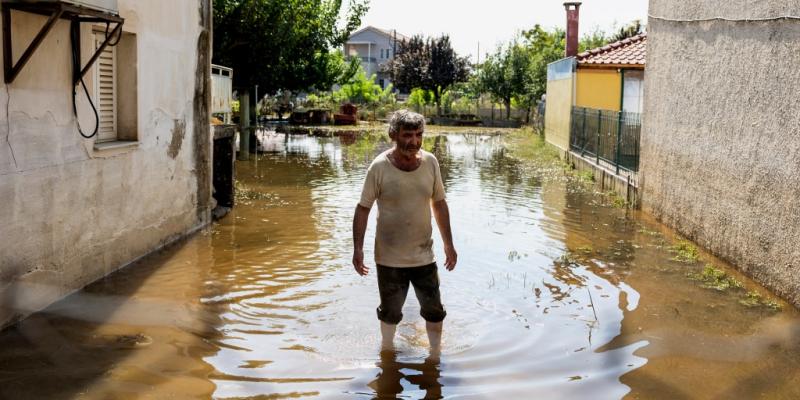


The catastrophic flooding in Libya that is feared to have left as many as 10,000 people dead is just the latest in a string of intense rain events to hammer various parts of the globe over the past two weeks.
In the first 11 days of September, eight devastating flooding events have unfolded on four continents. Before Mediterranean storm Daniel sent floodwaters surging through eastern Libya, severe rain inundated parts of central Greece, northwestern Turkey, southern Brazil, central and coastal Spain, southern China, Hong Kong and the southwestern U.S.
Seeing that many unrelated extreme weather events around the world in such a short time is unusual, said Andrew Hoell, a research meteorologist at the National Oceanic and Atmospheric Administration's Physical Sciences Laboratory.
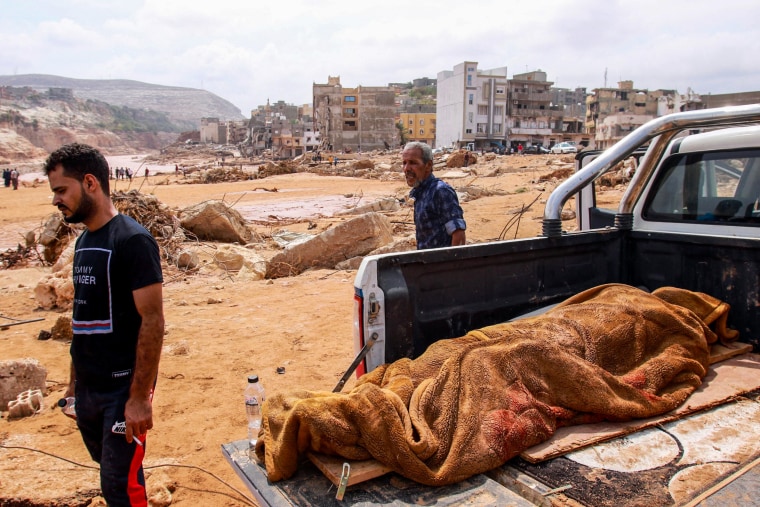 People walk past the body of a flood victim in Derna, Libya, on Monday.AFP - Getty Images
People walk past the body of a flood victim in Derna, Libya, on Monday.AFP - Getty Images
"Sometimes we have a clustering of these events, whether it's in a given country, given hemisphere or globally," he said. "And it seems like right now, globally, this is prime time for a number of flooding events."
As with many other forms of extreme weather, scientists say climate change is most likely having an impact on rainfall and flooding, but understanding precisely what that relationship is can be tricky.
In general, studies have shown that global warming is intensifying the planet's water cycle. Warmer temperatures increase evaporation, which means a warmer atmosphere can hold more moisture. As a result, when storms can unleash more intense precipitation and thus cause severe flooding.
 People mourn in Mucum, Rio Grande do Sul, Brazil, on Saturday.Claudia Martini / Xinhua News Agency via Getty Images
People mourn in Mucum, Rio Grande do Sul, Brazil, on Saturday.Claudia Martini / Xinhua News Agency via Getty Images
Researchers have observed those changes over time as the world warms. Since 1901, global precipitation has increased at an average rate of 0.04 inches per decade, according to the Environmental Protection Agency.
However, a number of factors can influence flooding events and their severity, and teasing out the fingerprints of climate change when they all interact can be challenging, Hoell said.
"From a 1,000-foot view, it's definitely true that if you have higher temperatures, you have more water vapor, and therefore you can have more precipitation fall from the sky," he said. "But when you look at a specific event and the specific set of physical processes relevant to that event, it then becomes difficult to attribute every single process in that causal chain."
For one thing, the types of extreme weather that caused each of the eight catastrophic flooding events this month had different origins.
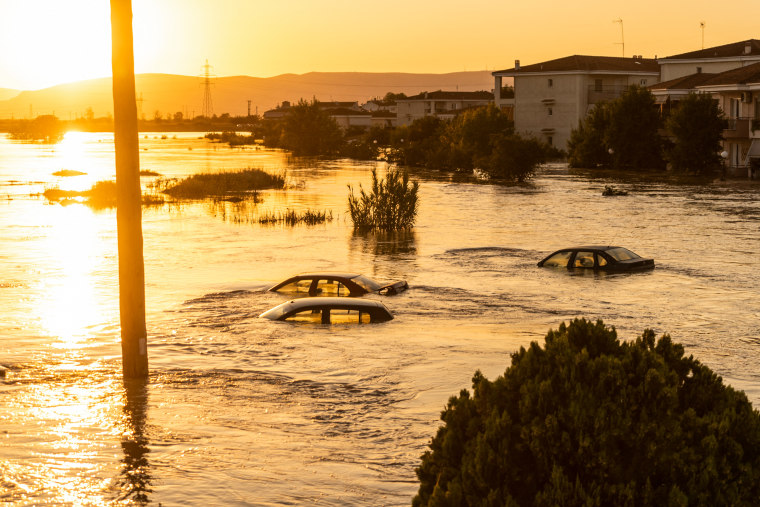 A flooded neighborhood in Larissa, Greece, on Sunday.Nick Paleologos / SOOC/AFP via Getty Images
A flooded neighborhood in Larissa, Greece, on Sunday.Nick Paleologos / SOOC/AFP via Getty Images
It was a Mediterranean storm named Daniel that dumped heavy rain over central Greece and Libya. Typhoon Haikui and its remnants lashed Hong Kong and southern China with record rain, waterlogging urban and rural areas, destroying roads and causing more than 100 landslides.
Torrential downpours caused flash flooding in central and coastal regions of Spain, northwest Turkey and thousands of miles away in the Brazilian state of Rio Grande do Sul.
And fast-moving thunderstorms over southern Nevada this month caused flash flooding across the region, swamping the Las Vegas Strip and stranding more than 70,000 people at the Burning Man festival in Black Rock Desert.
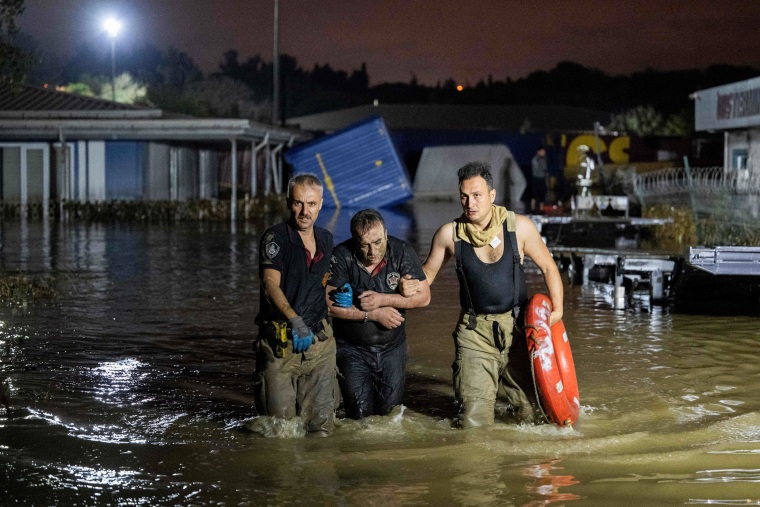 A man is rescued and evacuated during flooding in Istanbul on Sept. 5.Yasin Akgul / AFP - Getty Images file
A man is rescued and evacuated during flooding in Istanbul on Sept. 5.Yasin Akgul / AFP - Getty Images file
With certain types of extreme flooding events, such as those associated with Mediterranean cyclones like Daniel, there simply isn't enough data to observe shifts over time.
"We really don't have a long enough sample or record to be able to detect a change, because they're not really that common of an occurrence," Hoell said.
In other cases, local factors, such as how wet or dry the ground is or an area's basic topography, can have enormous influences on how floods develop — and their consequences.
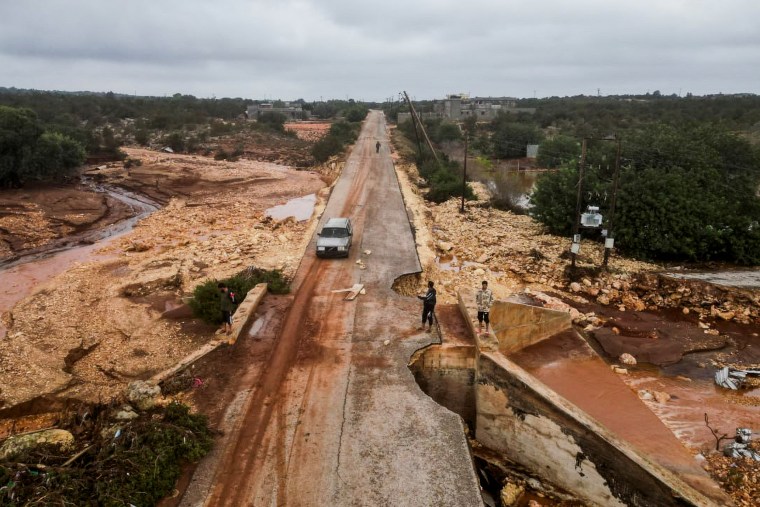 A damaged road after a powerful storm and heavy rainfall hit Shahhat, Libya, on Monday.Ali Al-Saadi / Reuters
A damaged road after a powerful storm and heavy rainfall hit Shahhat, Libya, on Monday.Ali Al-Saadi / Reuters
Beyond loss of life and property, floods increase the risks of exposing people to waterborne pathogens, which have important implications for outbreaks of deadly disease.
Hoell said the number of devastating floods this month is distressing, but he said he's especially concerned about the situation unfolding in Libya.
"If you look at the damage and the amount of people who have lost their lives," he said, "it just blows your mind."
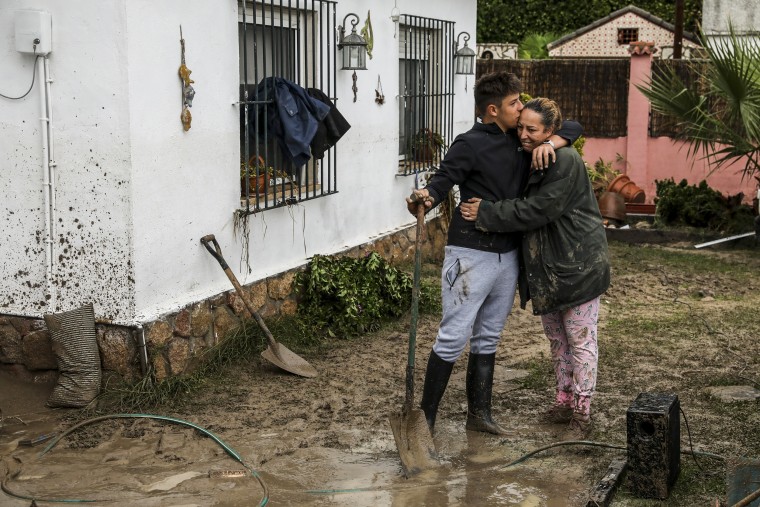 A woman hugs her son as they clear her house from mud after heavy rain in Villamanta, Spain, on Sept.
A woman hugs her son as they clear her house from mud after heavy rain in Villamanta, Spain, on Sept.






Shades of the movie 2012. Seems that the time has come to build an ark. New possibly habitable planets are being discovered by the new James Webb telescope. LINK ->
Ever watch the movie Waterworld? I can't wait to see Avatar: The Way of Water. Maybe everyone better learn to swim.
How long can you tread water?
Might be time to go ark shopping. Already have two dogs and two cats.
Tread water? Not long in my case, I'm a lousy swimmer, which is why I had both my kids work up to Red Cross Lifesaver qualification - the highest level. Are you sure your animals are both male and female?
There is no need for an ark, there is only a limited amount of on land ice yet to melt, at most the sea levels will rise another 25 feet to maybe 75 feet, you'll see places like Florida go under and other near sea low lands but that's it. And while the low lands go under the ice sheets will start building in the north and high altitudes in the south and the sea levels will drop again.
I recall long ago being asked if I would prefer to live by the sea, at the desert or near the mountains. I chose the sea, but these days I'm glad I live in a city where one of its nicknames is "The Mountain City".
Another yawner.
The trouble with articles like this is that they don't bother to define what "extreme" weather events are, nor do they provide any scientific data to support a bunch of unscientific assumptions..
And yet the fossil fuel industry still pays people to deny the reality of AGW.
But this sort of pressure is okay?
imagine thinking there’s no financial/career pressure on scientists to push narratives.
The IPCC itself doesn’t believe there’s a link between AGW and any increase in flooding .
Correlation is not causation. The article is reporting on a correlation. So, that reporting is much more a political narrative than a telling of scientific truth. Climate scientists cannot confirm or deny the political narrative based upon a correlation.
Politics disguising itself as science certainly doesn't engender any sort of trust in this type of reporting. Claiming that 'climate change did it' based upon a correlation isn't any more valid than claiming 'God did it'.
God's crying?...
Notwithstanding what both Nerm and Greg just said, I see what's happening as Nature getting even with mankind for the torture that has been imposed upon it.